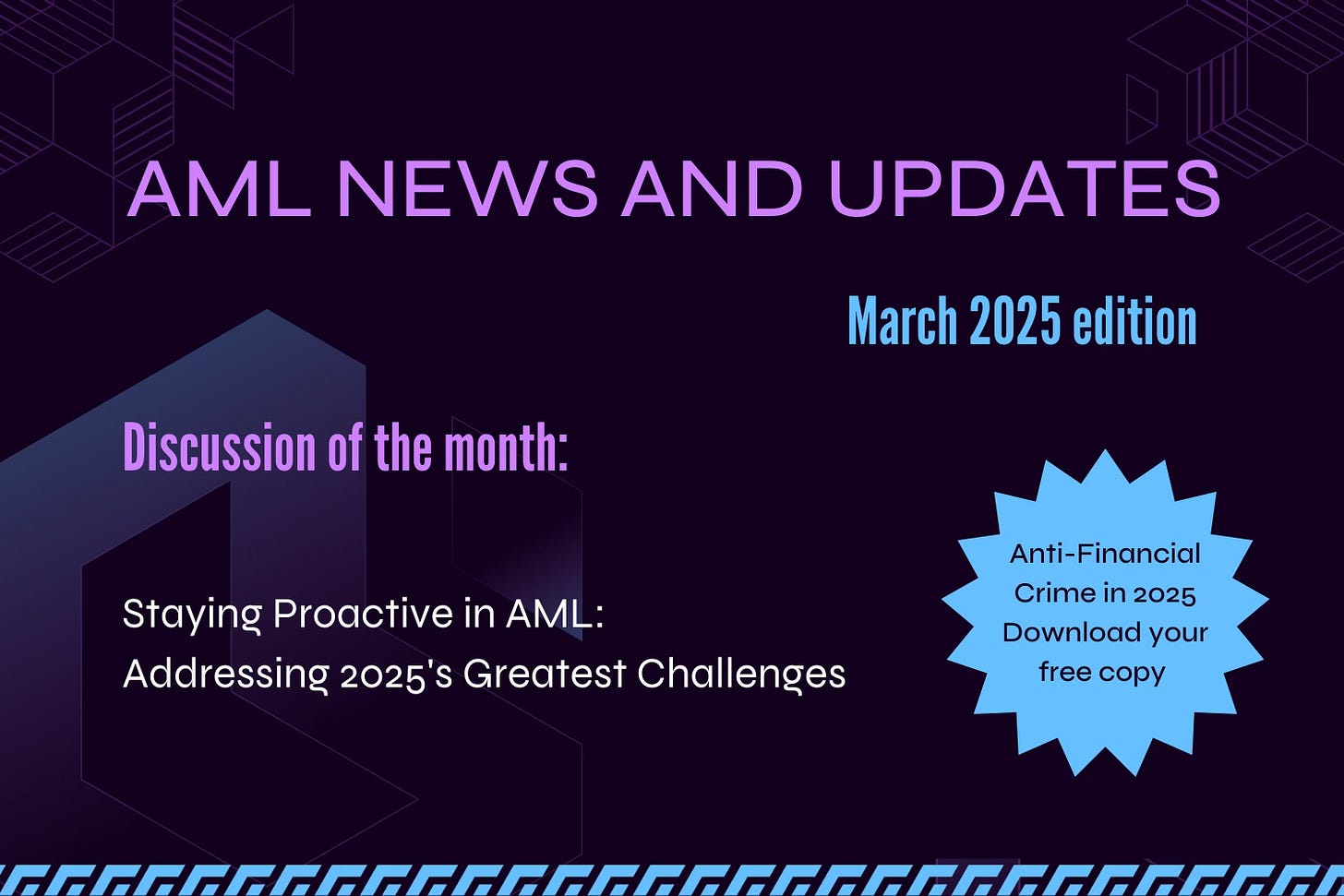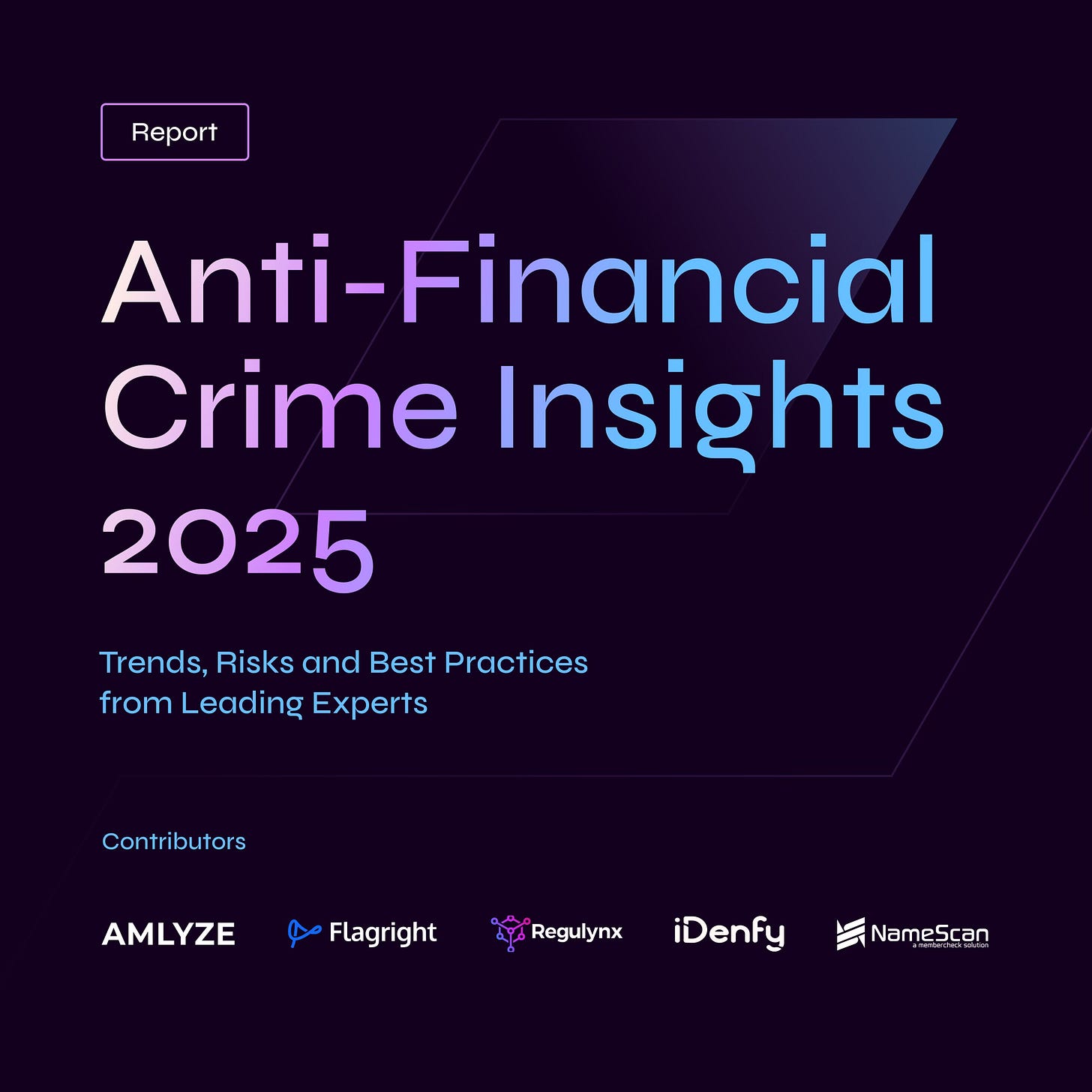Staying Proactive in AML: Addressing 2025's Greatest Challenges | The Scam Prevention Framework in Australia | Key Outcomes from the FATF Plenary Meeting and more
Welcome to our AML News and Updates Newsletter - March 2025 👏
This month, alongside key updates and industry insights, I’m excited to share that the Anti-Financial Crime 2025 Report is now available!
Packed with expert contributions and practical guidance, it’s a must-read for compliance professionals navigating today’s challenges.
Thanks to our sponsors for their contribution:
Flagright and Baran Ozkan, CAMS
iDenfy and Domantas Ciulde
Regulynx and Chantal Felter-Zeegelaar
AMLYZE and Alexandre Pinot, CAMS
NameScan and Shaun Thomas
Let's see an outline of the topics to be covered in this edition:
Discussion of the month: Staying Proactive in AML: Addressing 2025's Greatest Challenges
Regulatory Developments:
The Scam Prevention Framework in Australia
Key Outcomes from the FATF Plenary Meeting
British Virgin Islands Criticised for Beneficial Ownership Policy
3. Other News:
FinCEN Fines Brink's Global Services USA, Inc. $37 Million
OKX Exchange will Pay Penalties of More than $500 million
Europol Cracks Down on €1 Million Money Laundering Network in Spain and Portugal
Found this publication useful?
Let’s start…
Staying Proactive in AML: Addressing 2025's Greatest Challenges
Financial criminals are always one step ahead, finding new ways to exploit weaknesses before institutions can react.
The recent Bybit hack is a perfect example—criminals stole $1.5 billion without breaching any security system. Instead of breaking through firewalls or cracking encryption, they manipulated operational processes. This proves that even the increasingly sophistication of criminals.
And this is the challenge AML teams face in 2025. Criminals are evolving, regulations are becoming more complex, and outdated systems are struggling to keep up.
The question isn’t just how to respond, but how to stay ahead.
So, what are the biggest obstacles standing in the way?
Greatest Challenges in AML for 2025
One of the most frustrating realities in financial crime prevention is that fraudsters aren’t playing by the same rules. While compliance teams are buried in regulations and outdated systems, criminals are innovating faster than ever.
Fraud Tactics Are Evolving
Fraudsters are no longer relying on simple deception. They are using AI-generated deepfakes, synthetic identities, and automated scams that look more real than ever before.Financial institutions are constantly playing catch-up, trying to detect fraudulent activity that no longer follows predictable patterns. It’s not just about spotting anomalies anymore - it’s about recognizing deception in an environment where everything appears legitimate.
False Positives Remain a Burden
If you work in AML, you know how exhausting it is to sift through endless false positives. The alerts never stop, and most of them lead nowhere.But ignoring them isn’t an option either. The challenge is real - teams are drowning in noise, trying to find the few truly suspicious activities hidden among thousands of false alarms. And as regulations tighten, the pressure to be both fast and accurate is only increasing.
Regulatory Complexity Is Increasing
Just when teams start to get a handle on existing regulations, new ones emerge. Beneficial ownership transparency, digital assets, and stricter reporting obligations are making compliance more demanding than ever.But it’s not just the volume of regulations - it’s the inconsistencies between jurisdictions that create confusion. A rule that applies in one country might not apply in another, forcing teams to navigate a constantly shifting landscape with no room for error.
System Overload and Legacy Tools Create Confusion
Ask any AML professional, and they’ll tell you how frustrating it is to work with outdated, disconnected systems. Too many tools, too much data, and not enough integration.Instead of making compliance easier, these systems often slow everything down, creating bottlenecks and making it harder to see the full picture. The result? Missed risks, inefficiencies, and mounting frustration among teams already under pressure.
How We Can Get Better
No one has all the answers, but the best way to improve is by learning from those facing the same struggles.
Because financial crime isn’t just about money laundering. It’s about fraud, corruption, and deception on a global scale.
We need to move beyond working in silos and start understanding what others are doing right- and wrong.
So, what can you do in 2025?
Learn from the Best
Recognise Industry-Wide Challenges
Take Meaningful Action
That’s exactly why the Anti-Financial Crime 2025 Report was created - to bring together real-world experiences, expert insights, and practical tips that can help you stay ahead.
Learn from industry leaders and take stay proactive steps in 2025!
The Scam Prevention Framework in Australia
On February 13, 2025, Australia passed the Scams Prevention Framework, a groundbreaking law requiring banks, telecom companies, and social media platforms to detect, disrupt, and report scam activities. Businesses failing to meet robust scam prevention standards could face fines of up to $50 million, and victims will have clear pathways to compensation if these standards are not met. While not guaranteeing automatic refunds, the framework strengthens consumer protections and holds businesses accountable.
Key Outcomes from the FATF Plenary Meeting
The second FATF Plenary under the Presidency of Elisa de Anda Madrazo has concluded in Paris from 19-21 February 2025. Delegates from over 200 jurisdictions discussed key global priorities for tackling money laundering, terrorist financing, and proliferation financing. Key outcomes included the removal of the Philippines from its 'grey' list, while Nepal and Laos were newly added to this list due to identified strategic deficiencies. The FATF also approved amendments to its standards to reinforce a risk-based approach, aiming to enhance financial inclusion without compromising the integrity of the financial system. The organisation also finalised a report on combating online child sexual exploitation, providing guidelines to track illicit financial flows associated with such crimes.
British Virgin Islands Criticised for Beneficial Ownership Policy
The British Virgin Islands (BVI) is facing criticism for its draft policy on beneficial ownership registers, which limits access to ownership data to those with a "legitimate interest" such as those involved in legal or regulatory proceedings related to financial crimes. Additionally, the owner of the company “would be tipped off about any such requesthave five days to object to the information being shared”.
FinCEN Fines Brink's Global Services USA, Inc. $37 Million
The Financial Crimes Enforcement Network (FinCEN) has assessed a $37 million civil money penalty against Brink's Global Services USA. The company facilitated the transmission of hundreds of millions of dollars in bulk currency shipments across the Southwest Border on behalf of high-risk entities—including a Mexican currency exchanger that later pleaded guilty to violating the Bank Secrecy Act (BSA). This marks FinCEN’s first enforcement action against an armoured car company.
OKX Exchange will Pay Penalties of More than $500 million
OKX pled guilty to operating an unlicensed money transmitting business and violating U.S. anti-money laundering laws. The exchange, one of the world’s largest cryptocurrency platforms knowingly served U.S. customers without proper registration, failed to implement adequate AML and KYC controls, and facilitated over $5 billion in suspicious transactions and criminal proceeds. In some cases, employees advised customers to provide false information to circumvent KYC procedures. The company also promoted its services in the U.S. while publicly denying access to American users. As part of the plea agreement, OKX will pay over $504 million in penalties and implement enhanced compliance measures.
Europol Cracks Down on €1 Million Money Laundering Network in Spain and Portugal
In a major crackdown against money laundering, Spanish and Portuguese authorities, with Europol’s support, dismantled a criminal network primarily composed of Russian nationals offering money-laundering services to EU-based criminal organisations. The group, active mainly in Spain, used the Hawala method—an informal value transfer system—to move illicit funds, primarily from drug trafficking. They laundered over EUR 1 million, with daily transactions sometimes reaching EUR 300,000. The operation led to 14 arrests, 9 house searches, and the seizure of over EUR 1 million in cash and cryptocurrencies.
Thanks for taking the time to read this newsletter!
Wishing you a great month!
Best
Anna Stylianou









